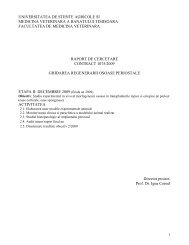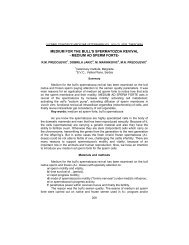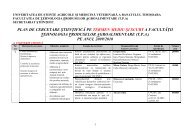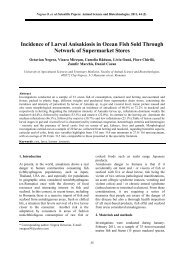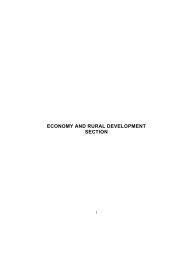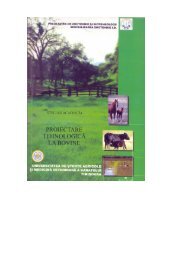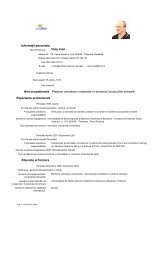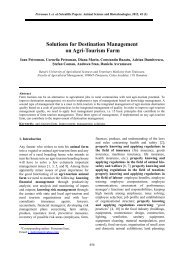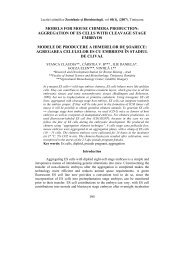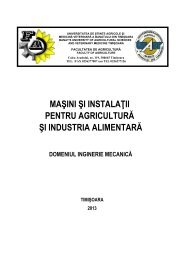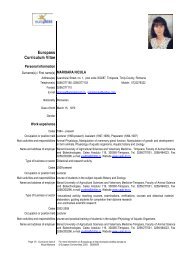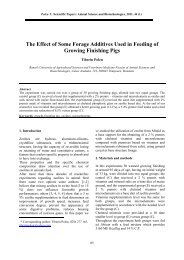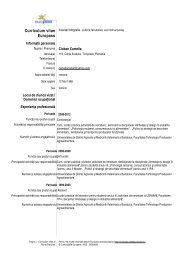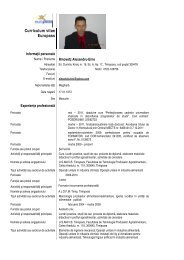journal of linguistic studies
journal of linguistic studies
journal of linguistic studies
Create successful ePaper yourself
Turn your PDF publications into a flip-book with our unique Google optimized e-Paper software.
predicting, making notes, retelling the text, looking for discourse markers, underlining,<br />
sorting out, mind-mapping) in order to be able to do the related exercises that required<br />
skills such as looking for a specific information, interpreting text, deducing meaning from<br />
context, understanding the structure <strong>of</strong> the text etc. These materials helped learners deal<br />
with complex texts as they developed their general reading abilities and skills such as<br />
selecting, linking, excluding irrelevant piece <strong>of</strong> information etc.<br />
3.4. WRITING<br />
Writing skills developed through a range <strong>of</strong> exercises related to paragraphing,<br />
summarizing (producing a concise piece <strong>of</strong> writing not necessarily being short), and<br />
correcting different texts for grammar and spelling errors.<br />
4. CONCLUSION<br />
In the context <strong>of</strong> life-long learning <strong>of</strong> legal pr<strong>of</strong>essionals and law students the Faculty<br />
<strong>of</strong> Law in Osijek has been <strong>of</strong>fering the ILEC course <strong>of</strong> Legal English among other<br />
language courses in English and German since 2008. The language skills that learners<br />
developed were speaking, reading, listening and writing. The courses <strong>of</strong> International<br />
Legal English Certificate were challenging for the learners (law students and legal<br />
pr<strong>of</strong>essionals), who were given tasks to do outside the class and to prepare for the classes<br />
to follow. These pieces <strong>of</strong> «homework» were according to the learners’ feed back<br />
demanding and time-consuming but also motivating. As adult learners have also much<br />
intrinsic motivation the tasks were taken as seriously as possible to avoid embarrassment.<br />
The course book used for the course supported the language learning strategies leading to<br />
development <strong>of</strong> all four skills expanding on legal terminology. In 2010 the Faculty <strong>of</strong><br />
Law in Osijek plans to <strong>of</strong>fer additional course <strong>of</strong> Legal English Introduction to<br />
International Legal English for intermediate level learners (law students or lawyers)<br />
preparing learners for using English in a commercial law environment, focusing on a<br />
variety <strong>of</strong> legal topics including company law, litigation and arbitration, criminal law and<br />
comparative law and developing learners’ understanding <strong>of</strong> the law while at the same<br />
time consolidating their language skills preparing learners for the International Legal<br />
English course.<br />
REFERENCES<br />
Block, D. & Cameron, D. (2001). Globalization and Language Teaching. London:<br />
Routledge.<br />
Brieger, N. & Kosta, J. (2008). Success with ILEC. Oxford: Summertime Publishing.<br />
Common European Framework <strong>of</strong> Reference for Languages. (2005). Strasbourg: Council<br />
<strong>of</strong> Europe.<br />
Dudley-Evans, T. & St. John, M.J. (1998). Developments in English for Specific<br />
Purposes. Cambridge: Cambridge University Press<br />
Day, J., Krois-Lindner, Amy & TransLegal (2006). International Legal English.<br />
Teacher’s Book. Cambridge: Cambridge University Press.<br />
Gubby, H. (2006). Practical Legal English: Legal Terminology. Den Haag: Boom<br />
Juridische uitgevers.<br />
Haigh, R. (2007). Legal English. New York: Routledge-Cavendish.<br />
55



